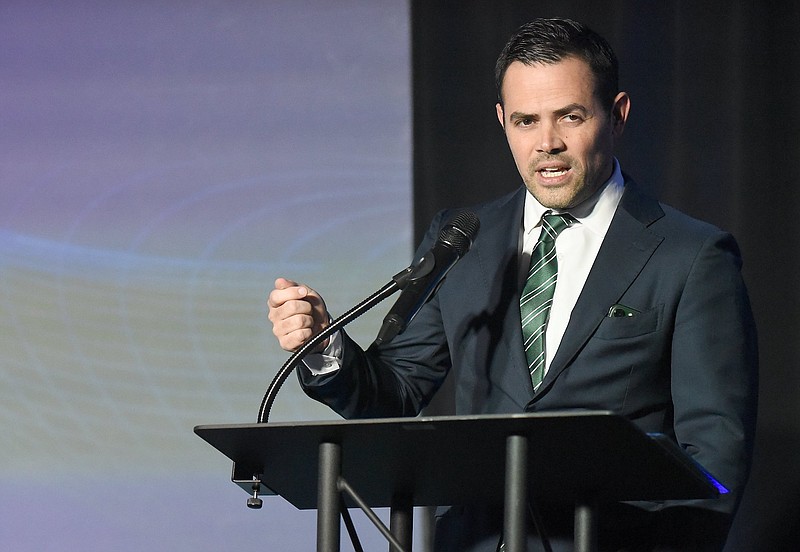Arguing they are more politically aligned with Tennessee lawmakers, Hamilton County Mayor Weston Wamp said county governments should receive their fair share of state sales tax revenue, some of which currently flows to cities under an 80-year-old agreement.
Decades ago, the state agreed to share a small portion of its sales tax collections with cities, Wamp told members of the conservative Pachyderm Club on Monday. All Tennessee cities benefit from the tax based on their population. Today, the city of Chattanooga receives about $20 million through that arrangement, according to Wamp.
In the time since, cities have generally shifted the responsibilities of running schools, jails and health departments to county government, Wamp said. Cities also tend to be more liberal than counties, he said, citing Knox County as an example.
"The politics of cities and counties are divergent," Wamp said. "(Chattanooga Mayor Tim Kelly) and I agree on a lot of different things, we work together on a whole lot of different things, but the reality is our constituencies are very different. The county is still overwhelmingly conservative ... and the city is increasingly liberal. And I'd say City Hall's politics are aligned about with the city -- they lean left like the city leans left."
(READ MORE: Tennessee kicks off budget season with experts predicting stagnant revenues)
In an email, city spokesperson Eric Holl said Tennessee schools get a greater share of state sales tax revenue than cities. Cities receive about 4% of the state's total sales tax collections in a given year compared to 7% for schools. Chattanooga residents are also Hamilton County residents, he added, and therefore pay county taxes.
According to a Tennessee Municipal League fact sheet provided by Holl, about 90% of the sales taxes realized by the state are generated within city limits. City taxes fund that economic growth, the organization said, which supports services and amenities that nurture businesses and make communities a desirable place to live and visit.
"Thus, city taxpayers finance the costs of much of the state's economic output through their city taxes," the sheet says. "As a result, any measurable economic growth is accompanied by an increased local tax burden borne by city residents."
In 1947, the state began sharing a portion of each year's total sales tax collections with cities, an agreement the Tennessee Municipal League said was designed to recognize the collective contributions of cities as the state's economic engines. It also acknowledges that city residents incur local taxes to maintain the economic environment necessary to jumpstart state sales tax revenue.
Pointing to the oftentimes heated relationship between Nashville leaders and members of the Tennessee General Assembly, Wamp said Monday the priorities of larger cities don't always line up with those of legislators.
"We've got a laundry list of big school projects (and) infrastructure needs in this county," Wamp said. "I know dozens of legislators across the state. They're much more aligned with the politics and the values of the counties of Tennessee than they are the big cities of Tennessee. That's not to say one should be defunded or funded. It's to say we should revisit that formula."
(READ MORE: Are Tennessee lawmakers more conservative than their constituents?)
Hamilton County leaders are getting ready to prepare their budget for the next fiscal year, which will run from July 1 to June 30, 2025. Last year, it totaled nearly $1 billion, with the majority of that going to Hamilton County Schools. In an interview, Wamp said officials grappled with a tight budget last year and will likely wrestle with an even tighter budget this year.
Wamp said he expects to speak with lawmakers about the issue after the current legislative session, noting he's talked to state Sen. Bo Watson, R-Hixson, who chairs the Finance, Ways and Means Committee.
"The legislators who are aware of the history and even the legislative intent ... also recognize that it doesn't make a lot of sense that the state just effectively cuts a check back to cities (and) doesn't have any similar funding mechanism back to counties," Wamp said, "even though, over time, counties have taken on more responsibility, whether that's jails, courts, health departments or public school systems."
Contact David Floyd at dfloyd@timesfreepress.com or 423-757-6249.
